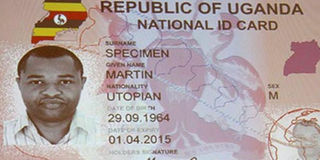Fix gaps in national ID database first

The declaration on Monday by the Health ministry to tie possession of national IDs to accessing drugs is a good idea. First, acquiring national ID is a civic duty every citizen should undertake. Second, the National ID database provides an essential and centralised reference for bio data of all Ugandans.
Third, a digitised healthcare database would help tag patients to personal bio data, home or village addresses and drugs dispensed. This also allows for tracking of patients and would cut down cases of ghost patients and misuse of drugs.
But possession of national ID should neither be a gunpoint directive nor a precondition for citizens to access services for now. And this is why. Our reservation is premised on a key gap; that our current national ID database has gross flaws and is open to abuse.
As a first step, what government needs now is to institute safeguards for citizen’s national data bank against infiltration and abuse by fraudsters.
Currently, our national database is plagued by gross flaws as has been exposed in recent cases of improper uses of Sim cards in kidnaps and cybercrimes. What government needs is to quickly develop and regularly update our alternative data sets references, including home and village addresses to check against nomadic criminals.
Moreover, the inordinate delays in the current issuances of national IDS once damaged, lost, stolen, or robbed makes the current dictum of tying national IDS to accessing drugs and other services illogical. It only exposes our citizens to risks of diseases and deaths rather than help them survive.
The above are precisely why the directives of tying possession of national IDS to services should be only advisory for now. In sum, this unilateral approach by the Health ministry to set up its own and parallel digital system is unwise. This planned stampeding order should be halted until a uniform, accessible and efficient digitised process is instituted across all ministries, departments and agencies (MDAs). This can then be used to check against ghost patients, workers, and bidders, among others.
As an alternative first step, MDAs can begin by demanding acceptable personal identification documents in order to access services.
Uganda’s laws give full guidance on bona fide personal verification documents. These include current passport, National ID, and current full photo card of Uganda Driving Licence. Any of these should, for now, be used to prove citizenship and entitlement to State services, including access to healthcare, salaries, and bidding, until goof-proof national ID database is constructed.
Finally, let’s sort out the gaps in our citizens’ database to provide credible, accurate, and verifiable bio data before MDAs begin to demand national IDs for citizens to access public services.




